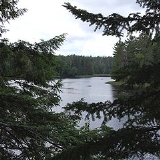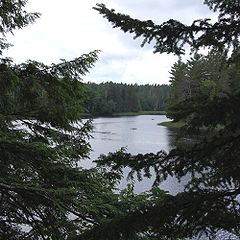
Molus River, New Brunswick
Encyclopedia

Richibucto River
The Richibucto River is a river in eastern New Brunswick which empties into the Northumberland Strait north of Richibucto, New Brunswick. It is 80 kilometres long.The river's name means "river of fire" in the Mi'kmaq language....
, located in Weldford Parish, New Brunswick
Weldford Parish, New Brunswick
Weldford is a local service district found in Kent County, New Brunswick, Canada that was established in 1835 with a local Agricultural Association and named for John W. Weldon and John P...
, Canada
Canada
Canada is a North American country consisting of ten provinces and three territories. Located in the northern part of the continent, it extends from the Atlantic Ocean in the east to the Pacific Ocean in the west, and northward into the Arctic Ocean...
. At one time named Moulies River Station, it is located 3.15 km North East of Bass River, Weldford Parish, New Brunswick on the road to Richibucto. In 1904 Moulies River Station was a stop on the Kent Northern Railway.
Molus River had a Post Office named Moulies River 1867-1950 and named Molus River 1950-1970 In the year 1871 Molus River had a population of 150. In 1898 Molus River was a farming, fishing and lumbering settlement with 1 post office, 1 church and a population of 300.
Community History -
Epsikitiáskuk is what the Mi’kmaq people of Elsipogtog First Nation
Elsipogtog First Nation
The Elsipogtog First Nation , formerly called the Big Cove Band, is a Mi'kmaq First Nation in New Brunswick, Canada, with a population of about 3090. The First Nation's territory comprises Richibucto Reserve #15, lying 9 km west of Rexton, New Brunswick.Elsipogtog or L'sipuktuk means River of...
called the Molus River as seen on old land grant documents at Provincial Archives New Brunswick.
A possible source for the word Molus is from the French language spoken by Acadian living in the Richibucto River area, with the word “moluёs” being a French word for a tidal flat mussel, a type of shellfish commonly found on muddy beaches along the river.
For a period from about 1850-1900 the name on maps was often spelled Moulies River and moulies is a type of coal shale that was harvested during the days of coal mining operations along the Coal Branch River, which is another tributary of the Richibucto River Estuary. There is also an old oral tradition that the river may have been named for a Henry Molus, an early settler or explorer in the area.
The first European settlers of the south side of the Molus River were 1821 Thomas Phelan (Whalen), John Phelan, Patrick Phelan. By the 1830s the north side was also opened and the Warman family settled here. Other settler names: Olsen, Dargavel, Stevenson, Millar, McPherson, Ward, and Harnett. The community reached its height in the late 19th century. By 1900 the community was in decline, the virgin forest of white pine and maple had been stripped from the land to supply the ship-building community down river at Kingston now Rexton
Rexton, New Brunswick
Rexton is a Canadian village in Kent County, New Brunswick.Situated on the Richibucto River, the village was originally inhabited by Mi'kmaqs, many of whose descendants still reside in the nearby Elsipogtog First Nation, formerly referred to as the Big Cove Band...
.
Land Grants at Provincial Archives New Brunswick indicate that in 1819 Molus River was "at the center of the Indian Reserve" when it was opened to British subjects for settlement. The community of Molus River, a farming and forestry community, now takes its name from the river. Elsipogtog First Nation
Elsipogtog First Nation
The Elsipogtog First Nation , formerly called the Big Cove Band, is a Mi'kmaq First Nation in New Brunswick, Canada, with a population of about 3090. The First Nation's territory comprises Richibucto Reserve #15, lying 9 km west of Rexton, New Brunswick.Elsipogtog or L'sipuktuk means River of...
is nearby.

